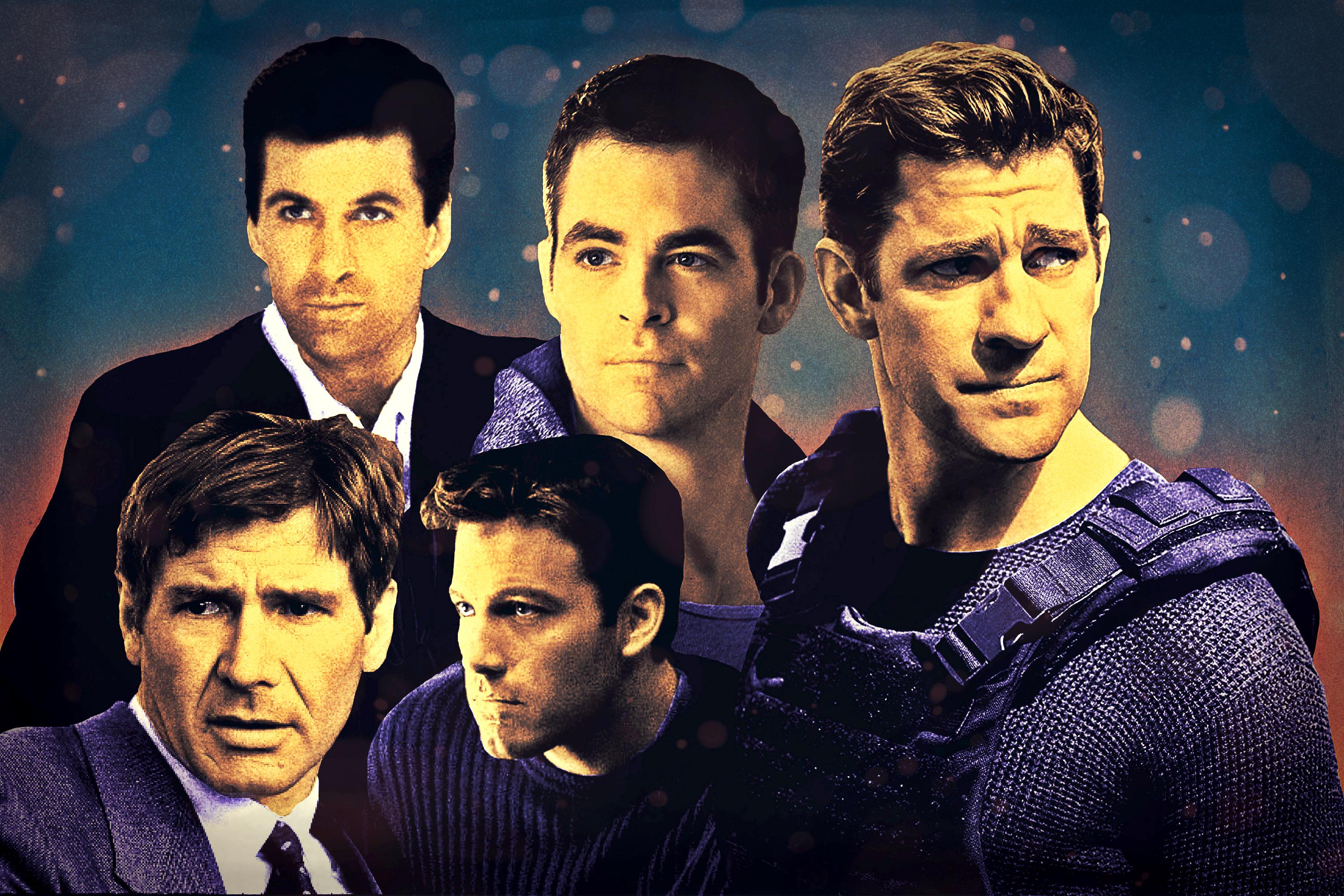
It takes him 37 and a half minutes of screen time, but finally, in the pilot episode of his new Amazon Prime series, John Krasinski gets to deliver one of the most famous catchphrases in action-hero history: “I can’t go to Yemen! I’m an analyst.” Yes, America, Jack Ryan is back: ex-Marine turned geopolitical whiz kid, doctor of economics and/or genius historian, hunky moralist, and last-minute briefer of various government big shots, up to and including the POTUS himself. He enthusiastically tracks the financial activity of terrorists, and then, reluctantly, he hops in a chopper and heads off to personally kick those terrorists’ asses.
Very reluctantly. “I don’t interrogate people,” adds the titular star of Jack Ryan, released on Amazon Friday. “I write reports.” He is standing on an airport runway and begging off this impromptu Yemen trip, but his grouchy new boss, James Greer, played by Wendell Pierce, is having none of it: “Get on the fuckin’ plane.” And because his country needs him once again, Jack Ryan does.
Krasinski is the fifth actor to slip into the great man’s suit jacket/bulletproof vest. “I am not field personnel—I am only an analyst!” protests Alec Baldwin, playing Ryan in 1990’s runaway-submarine thriller The Hunt for Red October, based on Tom Clancy’s blockbuster debut 1984 novel. Soon, he’s on the sub anyway. “You’re not a field man, Jack,” some chump bureaucrat crows to Harrison Ford in 1992’s Patriot Games. “You never were. You are an analyst. Analyze that.” The chump does not return for 1994’s Clear and Present Danger, but Ford sure does. “I’m a—I’m an analyst,” stammers Ben Affleck in 2002’s The Sum of All Fears. “I don’t go on the, the, you know, mission.” He goes on the mission. “No, I’m just an analyst,” objects Chris Pine in 2014’s Jack Ryan: Shadow Recruit, trying to squirm out of a trip to Russia. He goes to Russia, where he drowns a would-be assassin in a hotel bathtub. Reluctantly.
Jack Ryan is the sort of guy who cringes when you hand him a gun, and then cocks that gun with ultimate nonchalance. Affleck did exactly this and so does Krasinski. “He was physically unremarkable, an inch over six feet, and his average build suffered a little at the waist from a lack of exercise enforced by the miserable English weather,” is how Clancy, a Baltimore native and former insurance salesman, introduces his new hero in 1984’s The Hunt for Red October, which then-President Ronald Reagan praised as “my kind of yarn.” In time, in the books, Jack Ryan would himself become president, and onscreen, that “average build” stuff wouldn’t last. He’s an everyman reborn as a superman.
Clancy quickly assembled a right wing-leaning military-thriller empire, and his zeal for research more than compensated for his civilian status. (In his younger years, the Army turned him away on account of his nearsightedness.) He was the hotshot fighter-pilot heavyweight of airport fiction, lending his name to various spinoff book franchises and video games, a godfather of the mass-market author-as-guru-but-maybe-not-author approach taken up lately by the likes of James Patterson. He wrote or co-wrote 14 Jack Ryan Universe novels, and since his death in 2013 at 66, other authors have cranked out 10 more. (I have compiled the closing lines of every Tom Clancy novel here, for some reason.) For Christmas one year his first wife bought him a WWII-era M1A1 tank.
Meanwhile, as a character and an archetype, Jack Ryan got buffer and more conventionally action-heroic, but always preserved the fantasy that an Average Joe could mutate into G.I. Joe just by getting on the fucking plane. His onscreen misadventures follow a simple, satisfying pattern. One of America’s various enemies has hatched a nefarious, byzantine plot only Jack Ryan understands. Soon he unexpectedly finds himself briefing, say, the Joint Chiefs of Staff about it. And then, because he’s still the only person who understands it, and also because he’s super handsome and can take care of himself, he finds himself en route to, say, Moscow or Colombia. It’s a bored, stifled Washington desk jockey’s idle daydream: wow your bosses, humiliate your clueless office-fridge adversaries, and then go blow some shit up.
It’s maybe not so hot a time for this sort of fantasy, geopolitically. Krasinski is not the worst-case scenario to reprise this character, and it’s certainly a hoot to once again watch him hatching schemes in his little cubicle, defying his bosses and scrawling on Post-it notes and flashing those aw-shucks grins and affably acting all holier than thou. To answer your question, no, he never gives the camera this look, at least not early in the first season’s eight-episode run. (Maybe he’s saving that for Season 2, greenlit in advance.) To answer your other question, yes, there is already a mashup of Jack Ryan and The Office.
Amazon’s luxuriously gritty reboot, created by Carlton Cuse and Graham Roland—and executive-produced by, among others, longtime Jack Ryan steward Mace Neufeld and Michael Bay—spares no expense in terms of the shootouts, the explosions, and the grim travelogue scope. Jack Ryan at least aspires to delicacy and nuance—the characters in Yemen are more thoughtfully developed than the characters in D.C., and our tale takes some odd, queasy, prestige-adjacent detours. But as always, in addition to whatever global disaster our unstoppable hero is trying to stop, there is a deeper, more personal crisis to avert. It’s a battle for the soul of a character often described by his frenemies as a “self-righteous Boy Scout” naively devoted to the platonic ideals of “loyalty, cleanliness, and knot tying,” to quote Clear and Present Danger’s particularly odious chump bureaucrat. On a long and dark timeline, with his beloved CIA’s public image constantly soiled from within and without, can anything stop Jack Ryan from turning into Jack Bauer?
The Hunt for Red October, directed by John McTiernan, is the best Jack Ryan movie, in part because Jack Ryan is emphatically not the focal point. Alec Baldwin, in a decidedly simpler time for him, hits his marks. He outsmarts a roomful of doddering officers with a flagrantly goofy charm. He takes his coffee with sugar and cream. He doesn’t like turbulence. He talks to himself in the shower. He steers a sub directly into the path of a torpedo while discussing the book he wrote about Admiral Halsey. He shoots a guy, but sweats a ton while doing it. But above all he cedes the poster, and the movie itself, to Sean Connery as a lordly Russian naval supergenius. To be a real American hero you have to know everything, including your limits.
Harrison Ford, deep-voiced and roguishly mesmerizing, was an obvious upgrade. In the first 10 minutes of 1992’s Patriot Games, he both has sex and foils an assassination attempt on a cousin of the royal family. (Has sex with his wife—no 007-type playboy, Jack Ryan is always either happily married with kids or technically single but devoted to one woman, who is always a saintly doctor.) From there, the movie, directed by Phillip Noyce and based on Clancy’s 1987 novel, takes on a streamlined revenge-thriller shape, with Ryan’s family pursued by an enraged Irish terrorist played by Sean Bean. This requires Mr. Boy Scout to get his hands dirty: When the bad guys invade Ryan’s bucolic seaside Maryland home, he finds himself shooting one of those terrorists in the knee to get the intel he needs. He had no choice. He is careful, usually, not to tumble into that particular moral abyss. But you never forget the abyss is there, and outside this universe’s purview, it has only widened with time.
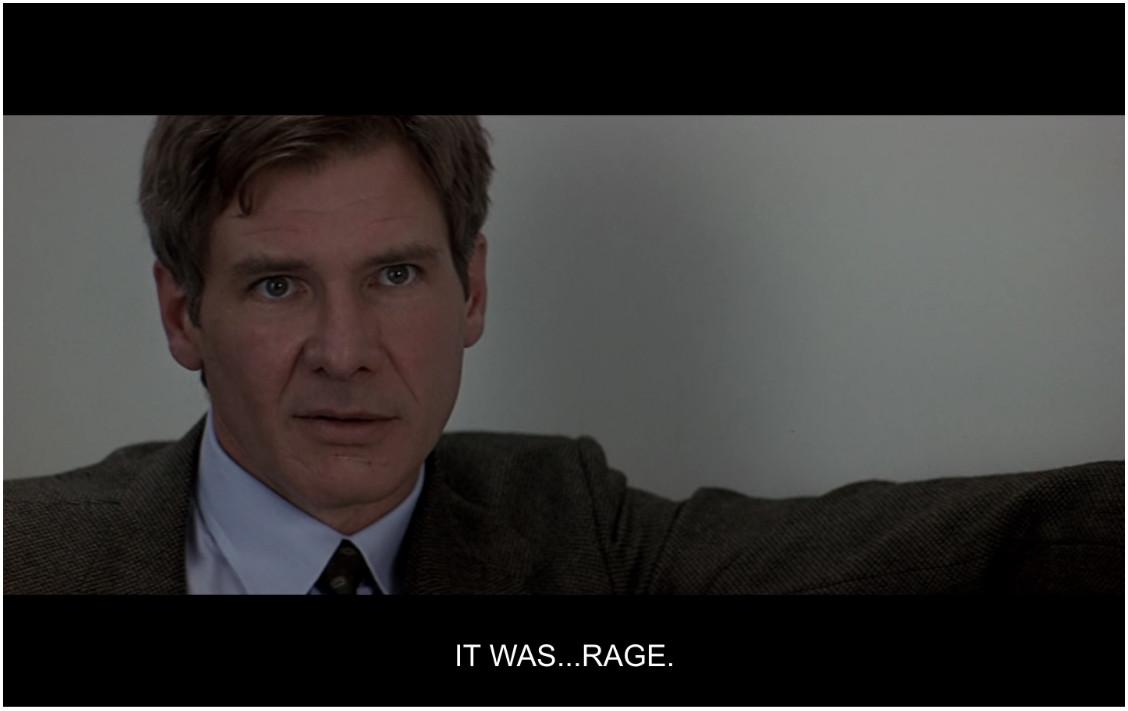
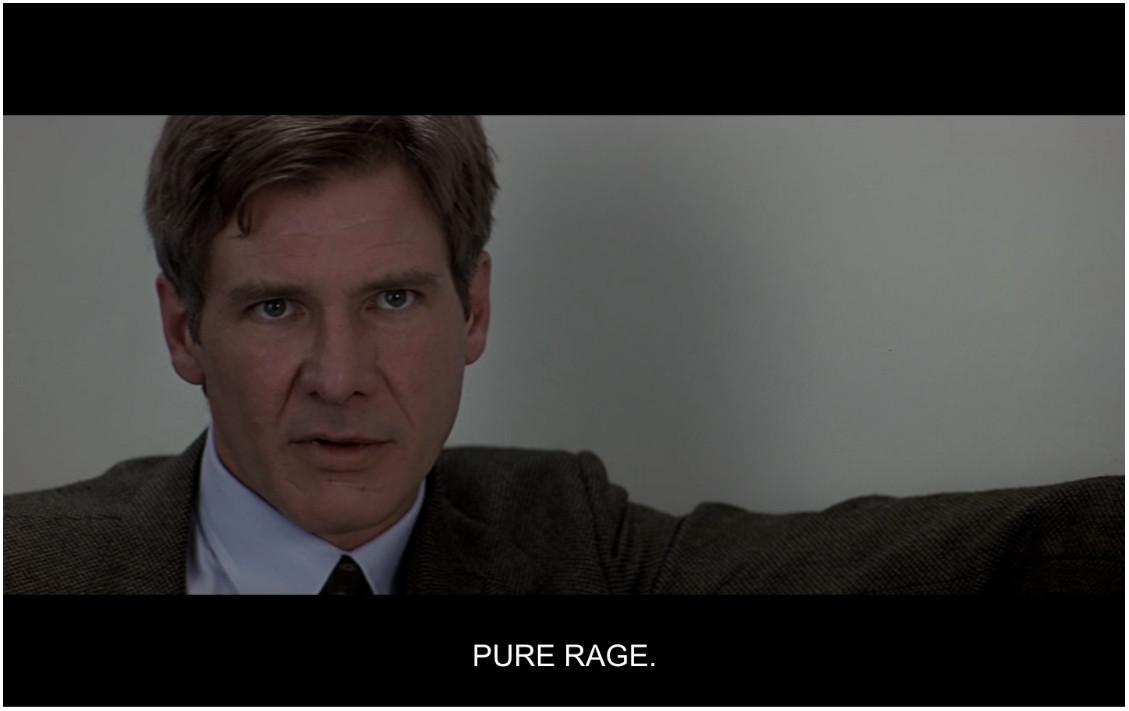
Released two years later, Clear and Present Danger, once again directed by Noyce and based on Clancy’s 1989 novel, has a bigger budget and a better cast: Henry Czerny as the snivelling office villain, Miguel Sandoval and Joaquim de Almeida as charismatic drug lords, and Willem Dafoe as a guerilla-war spook. But the whole Jack Ryan conceit is getting awfully broad. Meaning, for the climax, we find him clinging to a helicopter skid after personally extracting American soldiers from a Colombian drug den/prison, after which he personally dresses down the president of the United States for shoddy ethics. “The old Potomac two-step, Jack,” POTUS protests, and the music swells as our hero fires back: “I’m sorry, Mr. President. I don’t dance.”
Jack Ryan’s record in the 21st century is spottier. A year out before Gigli, Affleck gives 2002’s The Sum of All Fears, directed by Phil Alden Robinson, medium effort at worst—the wolfish grin, the brainiac broishness. He’s fine. This isn’t the sort of character you need to worry about “doing justice” to. But this is a full-blown disaster movie, and as a nuclear mushroom cloud envelops the Super Bowl, suddenly you’re in one of those woeful superhero farces in which hundreds of thousands of civilians die horribly but you’re supposed to care that, like, 12 people turn out okay. Ryan spends most of his time stumbling haplessly through the carnage—the dramatic conclusion involves him somehow briefing the Russian president—and the villains are crude sketches hastily dispatched in a sub-Godfather closing montage. As with, come to think of it, Affleck’s current Batman run, he’s not the problem, but this movie doesn’t feel good at all. Nonetheless, it made nearly $200 million worldwide, less than a year after 9/11.
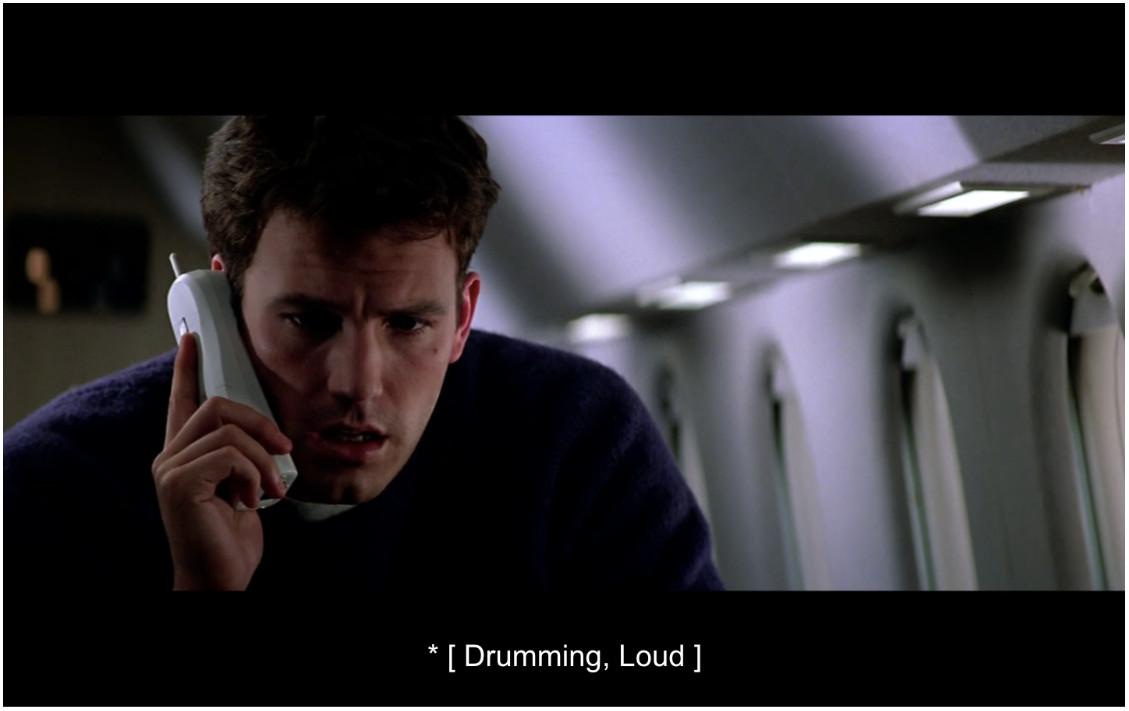
Given that outsized success and Hollywood’s insatiable thirst for durable IP, it’s remarkable that it took another 12 years to get us to Jack Ryan: Shadow Recruit, the first standalone movie unconnected to a Clancy novel. Directed by Kenneth Branagh, who also stars as yet another oily Russian supervillain, it’s got a little more swagger and a higher-brow steeliness reminiscent of the Jason Bourne series, speaking of action heroes that long outlived their creators. Pine, a few years yet from truly finding his footing in the Chris Wars, brings a casual brutality to his gnarlier fight scenes, and everyone—including Keira Knightley, in an American accent, as Ryan’s latest doctor paramour—gets to do a little more Acting. But still we wrap up with yet another motorcycle chase to foil yet another attempted bombing of Manhattan, and yet again our hero doth protest too much. “You sold this as an office job,” Ryan complains to his CIA handler, played by Kevin Costner, who shoots back with “You’re not just an analyst anymore. You’re operational now.” The music swells, the eyes roll.
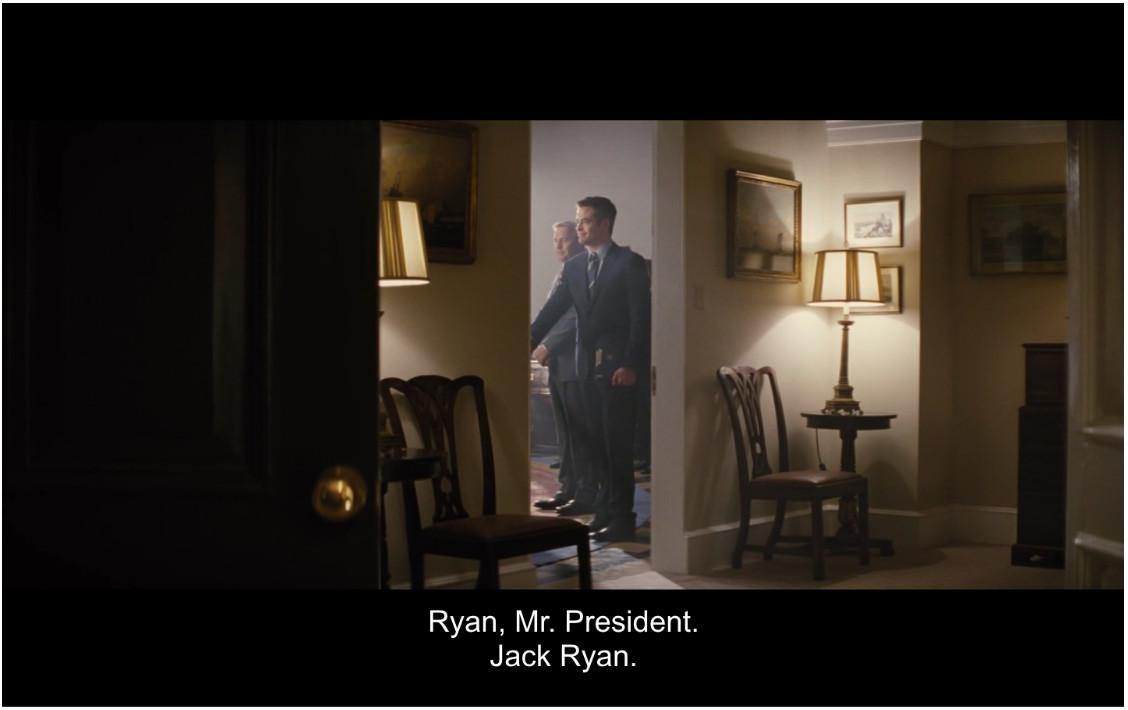
Amazon’s Jack Ryan is not reinventing any part of this wheel, but in the early going there’s a steady enough touch that you don’t feel crushed by it. Wendell Pierce, playing the indomitable mentor role handled in the movies by the likes of James Earl Jones and Morgan Freeman, has a very familiar and pleasing prickliness, and Krasinski’s meet-cute with Abbie Cornish, as the latest saintly doctor, is cuter than usual. (It ends with Ryan being extracted from a birthday party via helicopter.) As Endless War on Terror melodrama goes, there’s more depth here than in the likes of American Sniper, and more backstory and humanity granted to the other side. (An especially sad and strange subplot involves a guilt-ridden drone operator who wreaks havoc on Yemen from the uneasy comfort of Las Vegas.) There is visible effort, at least, to steer this series clear of pure jingoism and military fetishism.
But more than any fictionalized international catastrophe, that very tension is what defines the Jack Ryan universe. Can a self-righteous Boy Scout stave off a full heel turn forever? Is any semi-realistic portrayal of America’s behavior abroad doomed to devolve into grisly un-watchability? “How can you be in the CIA knowing everything your government does?” a grouchy French police chief demands of her new guest. “Well, I figure it’s better to be on the inside, maybe be able to change something, than be on the outside and not be able to change anything,” Ryan replies. Krasinski and the rest of the Jack Ryan braintrust at least appear to be on a similar mission. The season-long plot concerns the vengeful schemes of a Lebanese-born militant named Suleiman (played by Ali Suliman), described by Ryan as a potential bin Laden-caliber figure, but given more shading and backstory—including a doting younger brother (Haaz Sleiman) and a suspicious wife (Dina Shihabi)—than villains in this multiverse usually get.
That sense of progress, of course, is relative, and the resulting show will still play to some as “like falling down a Fox News rabbit hole,” per Vanity Fair; as for Krasinski himself, Buzzfeed recently posited him as red-state hero. Whether that’s his or the show’s intention is the central question in Jack Ryan, and of far greater importance than whether we’ll get to watch our man cling triumphantly from another helicopter skid or dress down another president. As 20-plus years of multimedia saturation have shown, the possibilities, for both good and ill, are endless. “What do you do for them?” the grouchy French police chief wants to know, still hung up on why this goody-two-shoes type is bumming around in the CIA. And Jack Ryan’s still got his catchphrase at the ready.

